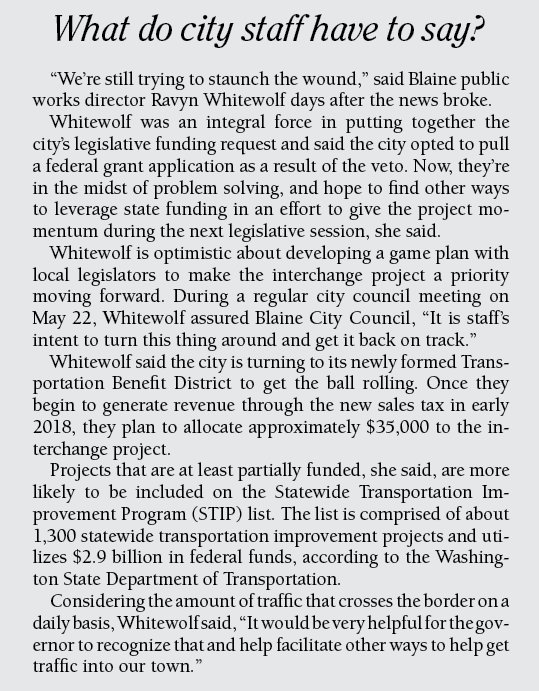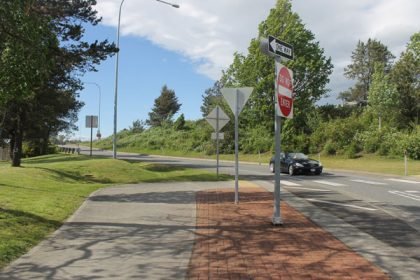 Governor Jay Inslee signs Senate Bill 5096 into law on May 16. Photos courtesy of TVW.
Governor Jay Inslee signs Senate Bill 5096 into law on May 16. Photos courtesy of TVW.
By Stefanie Donahue
Last week, Governor Jay Inslee vetoed millions of dollars in funding for a long-awaited project that would improve interstate access to Blaine. The move provoked a flurry of questions from legislators who are now calling on the governor for answers.
“The people of Whatcom County, and in particular the people of Blaine, are troubled and confused by your veto of a much needed transportation project at exit 274 on I-5,” read a letter penned by state senator Doug Ericksen (R-Ferndale) to Inslee. “We are all a little fuzzy on your reasoning.”
On May 16, Inslee vetoed multiple items from a transportation funding bill that was passed by the state senate in late April. The bill would have allocated $12,100,000 for the first phase of Blaine’s exit 274 interchange project during the 2023-2025 fiscal biennium. In a statement, Inslee cited a lack of information about the scope and cost of the project as the primary reason for the veto.
 “The I-5/exit 274 interchange project in Blaine does not appear in LEAP Transportation Document 2017-1, nor is there any information about project scope,” he wrote. “This LEAP transportation document should not be amended for a project without sufficient information about its scope and cost. For this reason, I have vetoed [the project from the bill].”
“The I-5/exit 274 interchange project in Blaine does not appear in LEAP Transportation Document 2017-1, nor is there any information about project scope,” he wrote. “This LEAP transportation document should not be amended for a project without sufficient information about its scope and cost. For this reason, I have vetoed [the project from the bill].”
But local reps don’t think that’s enough, particularly Ericksen.
“I invite you to come to Blaine in the coming weeks to enlighten us as to why you vetoed this project, to explain your concern about its construction in rural Whatcom County and to walk us through your view of why this project was so different than the projects which were not vetoed,” Ericksen said in the letter. “I think you owe it to the constituents of my district in person to provide your reasoning for taking this action.”
The effort to improve access to Blaine dates back to 2009, when the city completed an Interchange Justification Report to study access points. Currently, exit 276 is the first southbound exit from the border and is 6 miles away from the next available off-ramp. The report convinced city staff that lack of access was detrimental to the city’s economic development and they’ve since advocated for three iterations of a project aimed at improving the problem.
This year, they proposed a project at one-third to half the cost of the original $45 million requested during the prior legislative session in 2016. The proposal included the addition of a new southbound off-ramp on Interstate 5 at exit 274 onto Peace Portal Drive. Improvements also included the construction of a direct northbound connection to the industrial area from the existing northbound off ramp; the route would have been reconfigured to connect to Odell Street.
 Exit 276 is the first south-bound exit from the border and is 6 miles away from the next available off-ramp. Photo by Stefanie Donahue.
Exit 276 is the first south-bound exit from the border and is 6 miles away from the next available off-ramp. Photo by Stefanie Donahue.
Blaine has been close to receiving project funding for the past two legislative sessions. In 2016, Ericksen engineered a last-minute removal of the project from the transportation budget in favor of Ferndale and Lynden-based transportation projects; a move for which he received significant criticism. This session, he succeeded in adding an amendment to allocate money for the project during a senate debate.
In his letter to Inslee, Ericksen said at least three other projects were not included on the LEAP transportation document yet were approved and detailed descriptions of Blaine’s interchange project could be found in an earlier transportation package. He also argued that the addition of new projects and a slew of other over-budget projects discount the notion that the project would throw the state’s transportation budget off-balance.
“We had the money to pay for the project,” Ericksen said. “Other than pure politics, none of your reasons for vetoing this project make any sense.”
District 42 reps, Luanne Van Werven (R-Lynden), also a member of the House Transportation Committee, and Vincent Buys (R-Lynden) echoed Ericksen’s sentiment in a joint statement.
“The governor often speaks of job creation and ‘One Washington,’ but we’ve yet to see his priorities align with that very mentality when it comes to rural areas of the state,” they said. “His veto begs the question: Had the project been located in the greater Seattle area, would it have
met the same fate?
Comments
No comments on this item Please log in to comment by clicking here